Hi-Fi Hall of Fame
People Inductee
James B. Lansing

Introduction
James B. Lansing was a pioneering loudspeaker designer who established two audio companies that bear his name, Altec Lansing and JBL. He was also responsible for the development of many significant advances in loudspeaker technology.
Lansing was born on January 14, 1902, in Greenridge, Illinois, in the United States. He was the ninth of thirteen children born to that family. In 1925, he moved to Salt Lake City, Utah, and met Glenna Peterson, his future wife. Lansing was a gifted mechanic and engineer and worked for a radio station in Salt Lake City. About this same time Lansing met his future business partner, Ken Decker.
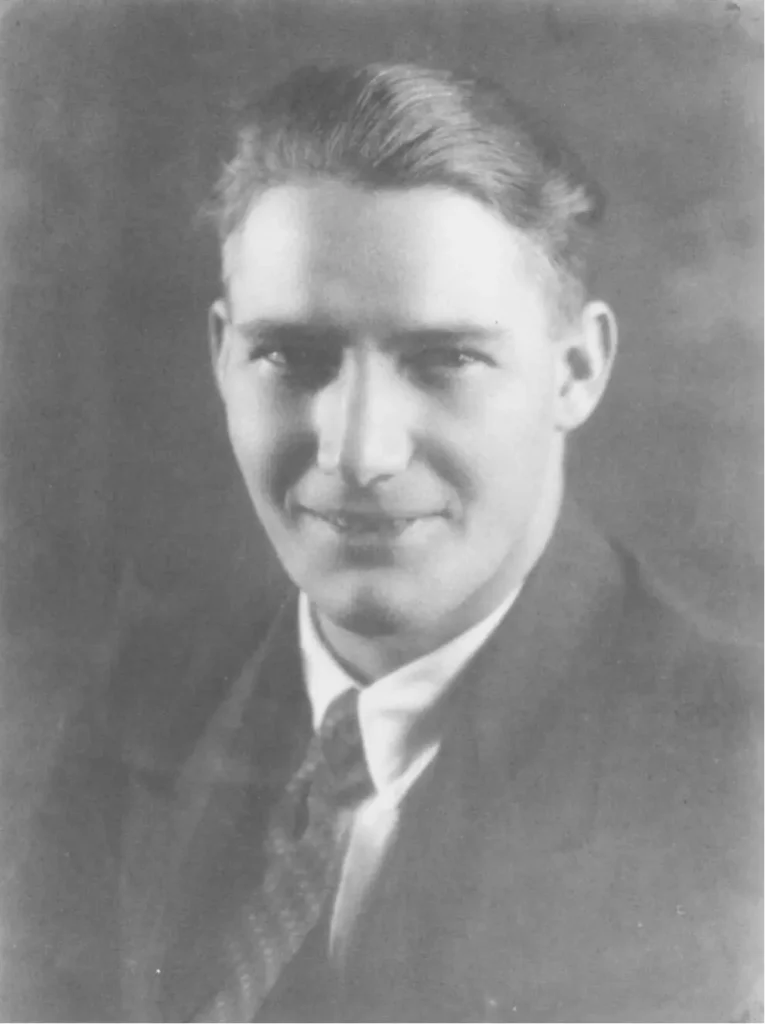
By 1927, Lansing and Decker had formed a business partnership, moved to Los Angeles, California, and founded a new company, Lansing Manufacturing Company. This company later became Altec Lansing Corporation. Lansing would go on to start another company, JBL Professional, which focused on producing loudspeakers and audio equipment for professional applications, such as studios, concert venues, and public address systems. This company evolved into the JBL that produced many excellent Hi-Fi speakers.
Over the course of his career, James Lansing made many contributions to the audio industry that were instrumental in advancing loudspeaker technology and improving sound quality in various applications. Sadly, Lansing encountered a number of business difficulties, and he took his own life on September 24, 1949. His legacy, however, continues through the companies he founded, which have remained influential in the audio industry even after his passing.
Let’s take a look at the many accomplishments of James B. Lansing.
Key Facts
| Name | James B. Lansing |
| Born | January 14, 1902 |
| Died | September 24, 1949 (aged 47 years) |
| Key Accomplishments | Founded Altec Lansing Founded JBL Developed the Shearer-MGM speaker Developed the Voice of the Theatre speaker |
| Hi-Fi Hall of Fame Induction | August 2023 |
James B. Lansing: A Lifetime of Accomplishments
James B. Lansing had a remarkable life, founding two iconic loudspeaker companies and developing a number of significant loudspeaker technologies.
Founding of Lansing Manufacturing
In 1927, Lansing and Ken Decker founded the Lansing Manufacturing Company. The company started out building small 6 inch and 8 inch cone speakers intended primarily for radio sets and consoles. They were certainly in the right place at the right time, as Hollywood introduced “talking” movies in the early 1930s and there was a need for high quality loudspeaker systems for movie theatres. Lansing Manufacturing was able to quickly pivot to manufacturing large, powerful speakers that were ideal for movie theatres.
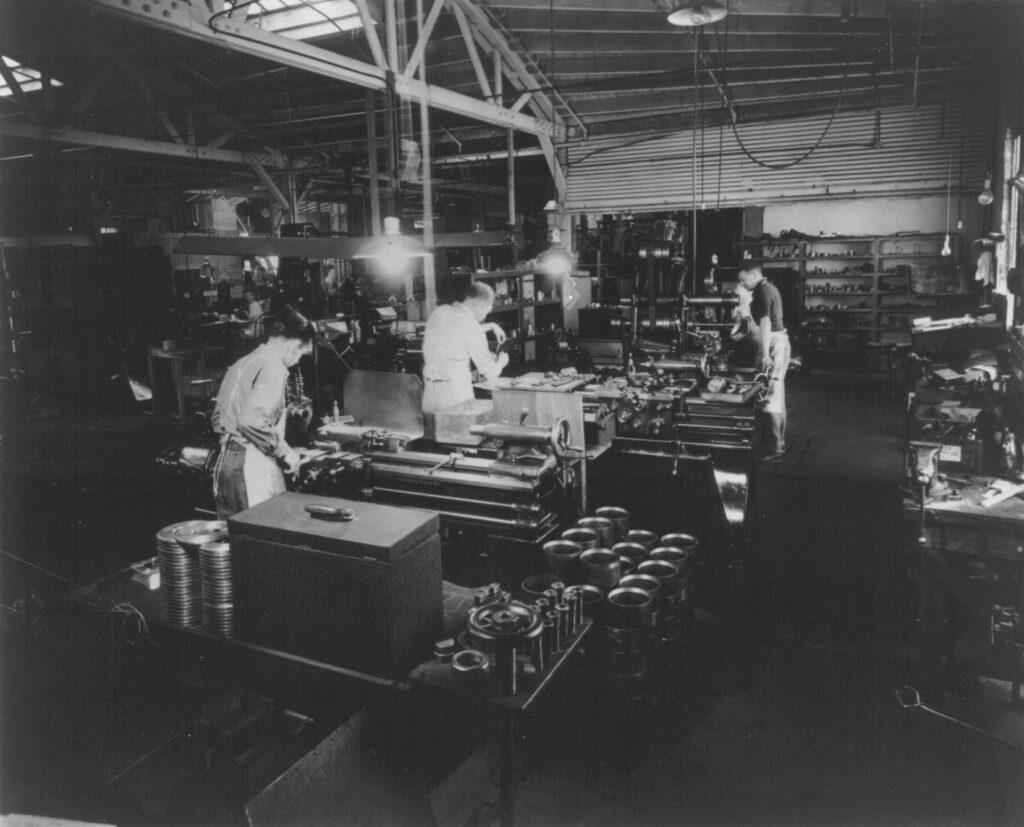
When the movie “Don Juan” was released to theatres in 1926, it was the first with a synchronized musical sound track and was very popular. This was followed by “The Jazz Singer” in 1927, with both music and spoken dialog, another first. The movie industry suddenly was in a rush to equip theatres with amplifiers and speakers to handle movie soundtracks. Lansing Manufacturing was well positioned to address this new market.
Shearer MGM Speaker
At that time, Metro-Goldwyn-Mayer (MGM) Studios was a major producer of movies. The company was dissatisfied with the existing theatre speaker systems and they decided to develop their own. The result was a design called the “Shearer-MGM” system, which was a large two way system consisting of a high frequency multicellular horn and a massive low frequency enclosure. MGM selected Lansing Manufacturing to develop the drivers, and James Lansing was the primary developer.
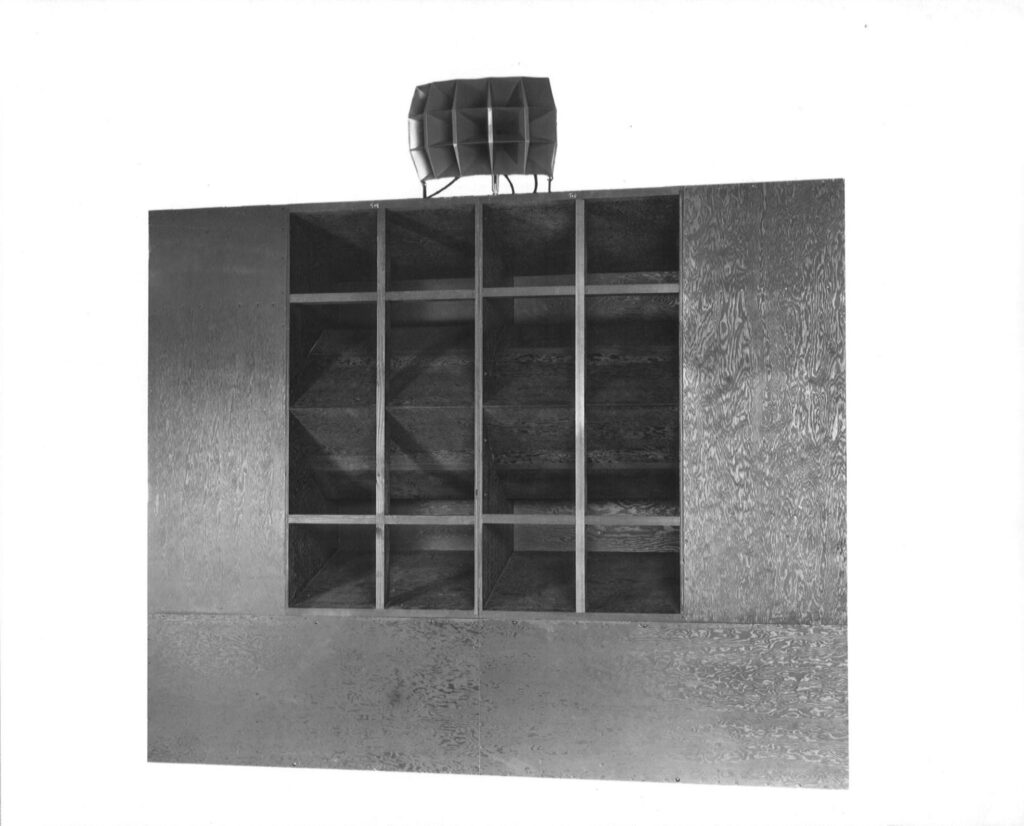
The Shearer-MGM employed a Model 284 high frequency driver which had a flat wire, 3 inch diameter diaphragm and a multicellular horn. Low frequencies were handled by an efficient 15-inch woofer with a paper-cone and a two inch round wire voice coil: the model 15XS. The Shearer-MGM speaker was a great success, and in fact the system won an award from the Academy of Motion Picture Arts and Sciences for technical excellence in 1937.
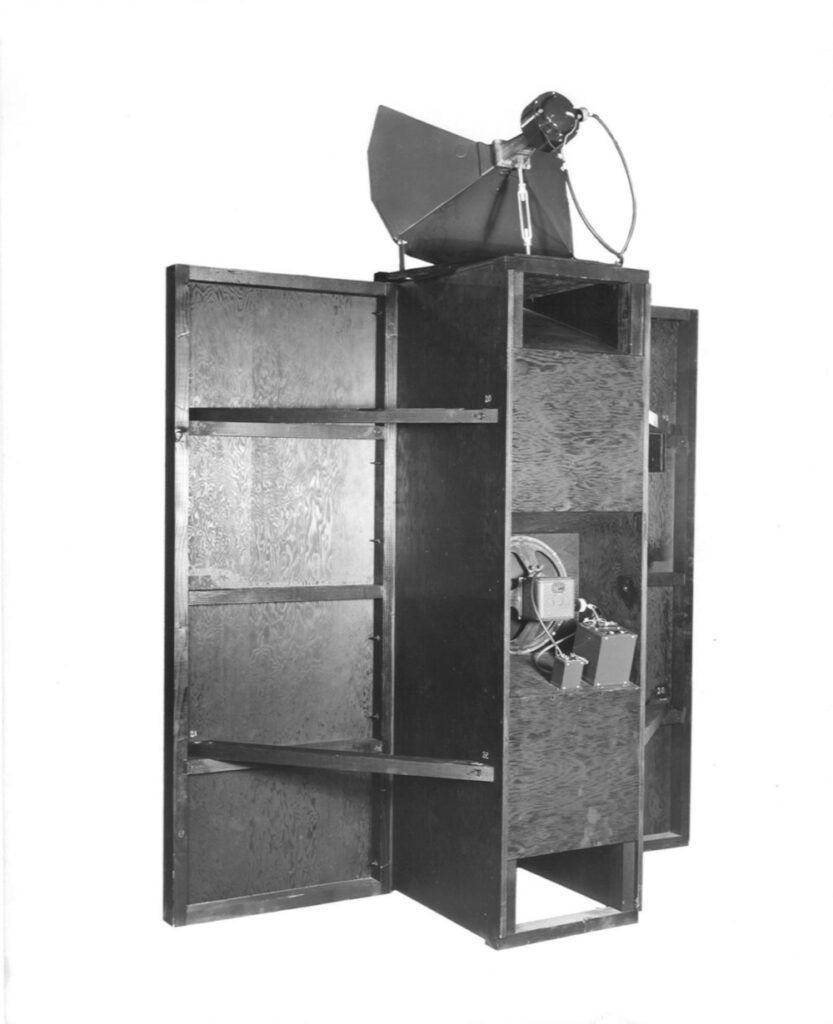
Iconic Loudspeaker
Around the same time, James Lansing turned his attention to developing a loudspeaker system that would have the sonic attributes of the Shearer Horn but with a smaller footprint. This speaker was intended for studios and smaller theatres. The result was the “Iconic” loudspeaker, which used a bass reflex cabinet, a new 15 inch bass driver, and a smaller compression driver mounted to a 4×2 multi-cellular horn. It was a 2 way speaker, with a crossover frequency of 800Hz. With an outstanding flat frequency response of 40Hz to 10,000Hz frequency response, the Iconic was an instant success for Lansing.
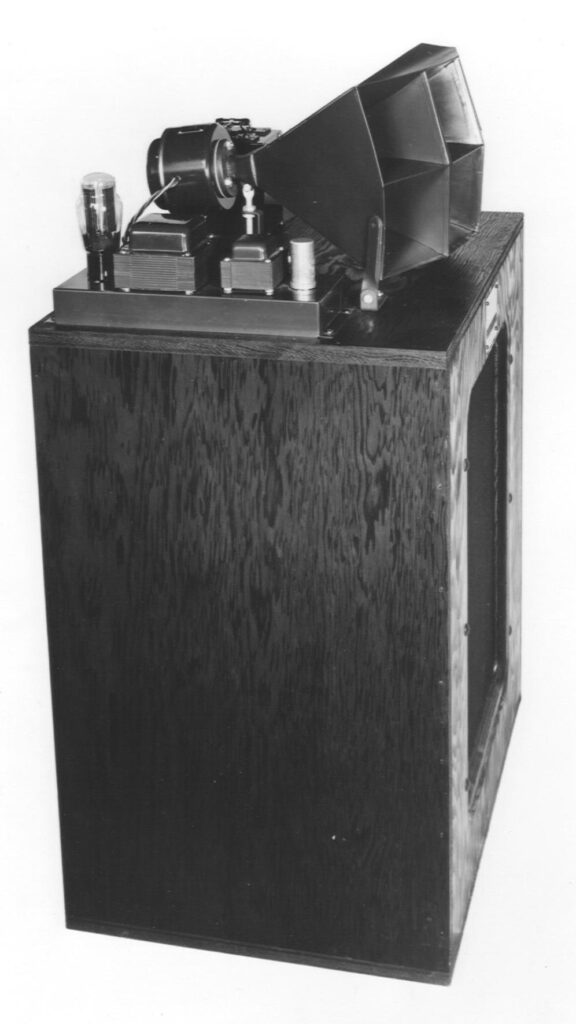
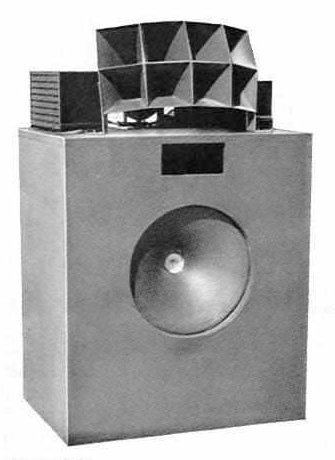
Altec Lansing Duplex Loudspeakers
In 1941, James Lansing agreed to merge Lansing Manufacturing with another company called Altec Services. The new company was called Altec Lansing, and James Lansing served as Vice President of Engineering for the new company for five years.
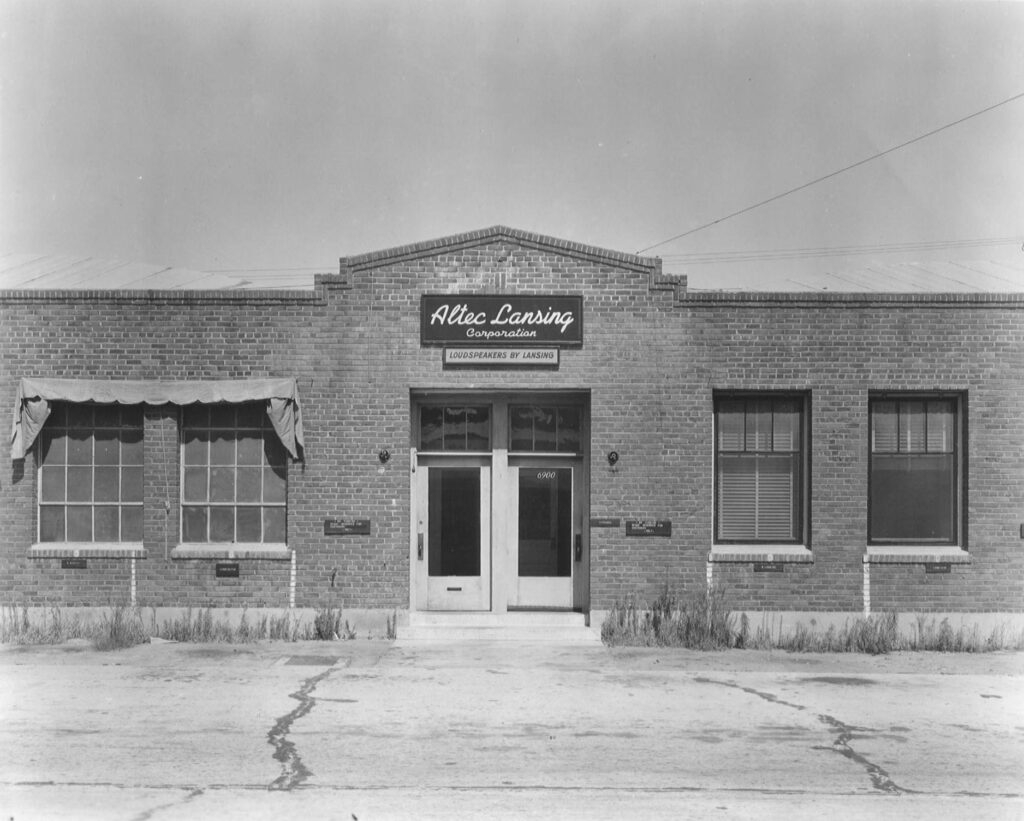
During his tenure with the new company, James Lansing was one of the primary developers for the remarkable Altec Lansing “Duplex” series of loudspeakers. The first in this series, the 601, was produced in 1941. The 601 demonstrated the proof of concept for the duplex design, but it had some shortcomings which needed to be remedied.
In 1944 Altec released the Model 604 Duplex, a replacement for the 601. Like the 601, the 604 combined a 15 inch woofer with a horn tweeter into a single driver. The new speaker employed Alnico magnets, a larger 3 inch voice coil for the woofer, and a cast aluminum frame. The new speaker was a huge success. It was versatile, and could be used for studio monitoring, home Hi-Fi systems, public address, or cinema sound systems.
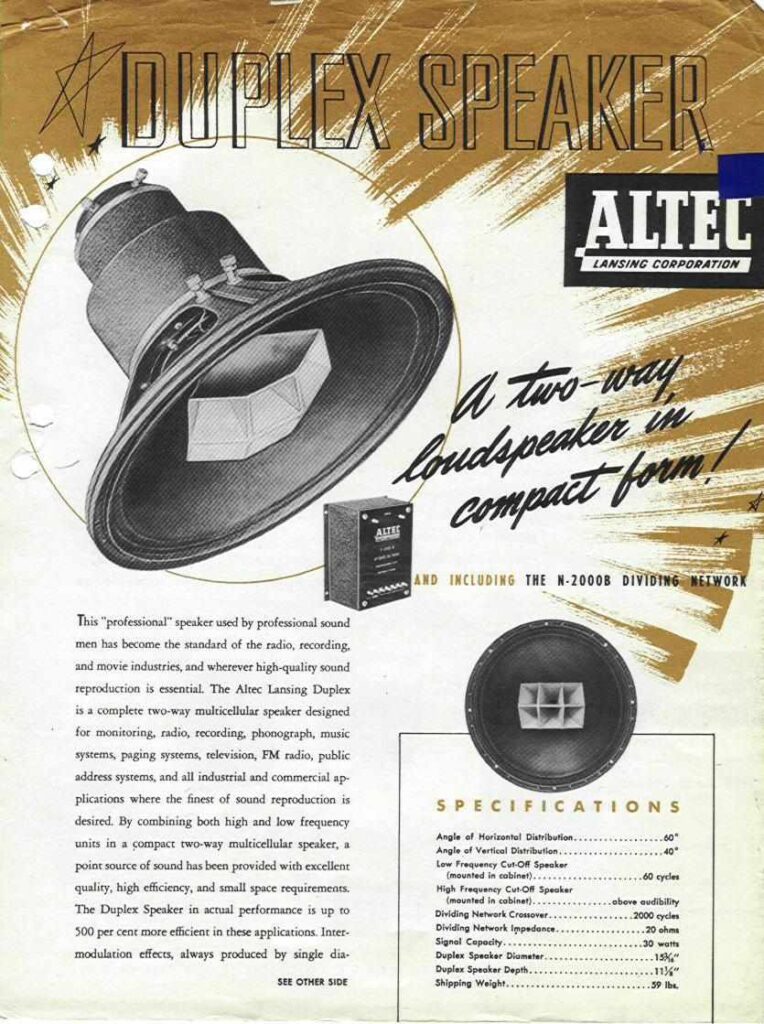
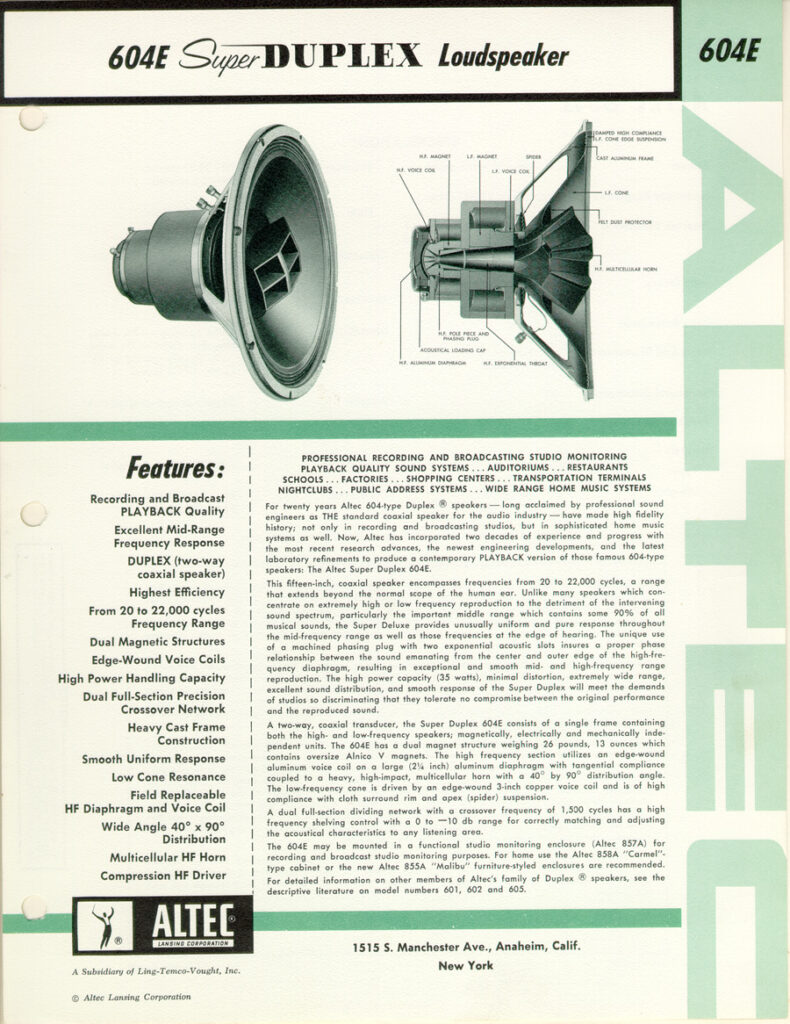
The 604 Duplex has evolved many times over the years, and has continued to sell well ever since it’s introduction more than 70 years ago! In 1998, the speaker faced extinction when the company’s owner Telex announced that it was shutting down Altec Lansing and discontinuing production of the 604. Fortunately, a new owner, Great Plains Audio, purchased the design and the tooling and continues to produce the 604.
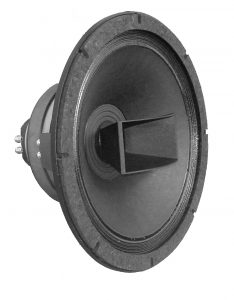
If you’d like to check out the latest iterations of the Duplex 604 loudspeaker, click on the link below to visit the Great Plains Audio website.
Voice of the Theatre
James Lansing was involved in the development of another iconic speaker system while working at Lansing: the “Voice of the Theatre”. Working with John Hilliard, Lansing developed the Model A-4 theater system, a large two way system standing about 8 feet high. The A-4 system was a significant advancement in cinema sound and became a standard in the movie industry. It featured an enclosed low frequency cabinet with a 15 inch woofer and a multicell horn for the high frequencies.
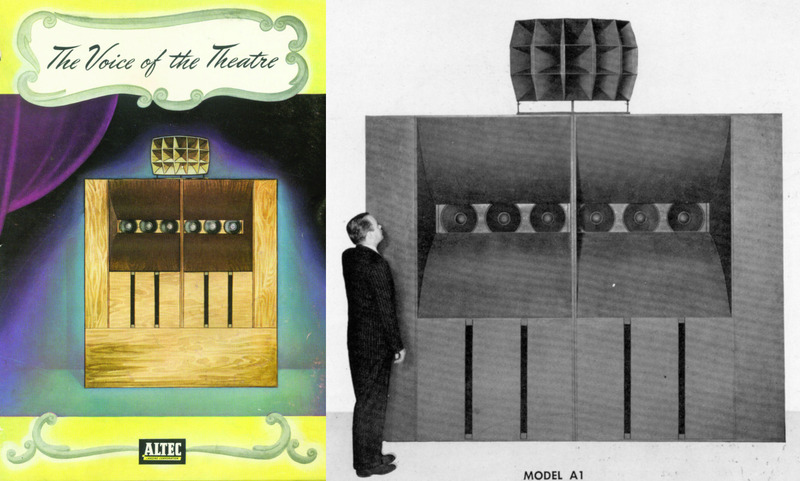
Over time, the Voice of the Theatre lineup expanded, as both larger and smaller versions were developed. One of the most popular versions was the Model A-7, which, despite it’s large size, is still sought after by audiophiles for large home Hi-Fi systems.
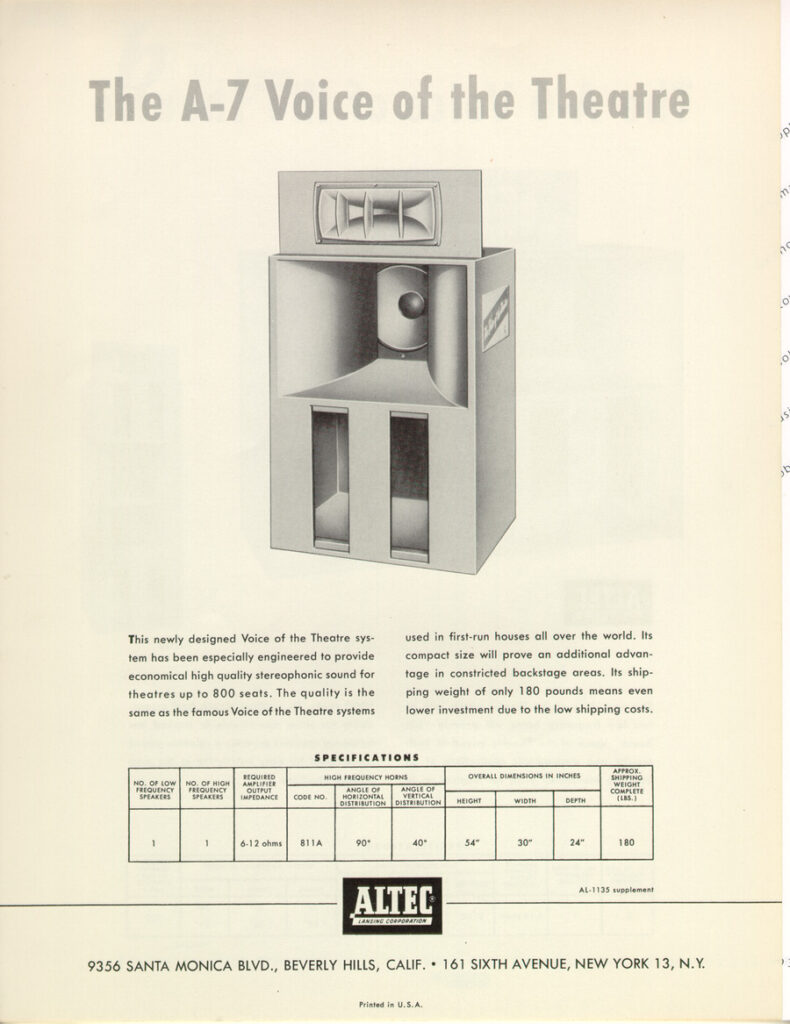
Founding of JBL Sound
After Lansing’s contract with Altec expired in 1946, he left the company and founded a new speaker company which would go on to become one of the most famous brands in Hi-Fi. The new company was originally named “Lansing Sound”, then “James B. Lansing Sound”, and finally, simply “JBL Sound”. JBL, of course, is still around today, more than 70 years after it’s founding, and still producing great Hi-Fi speakers.
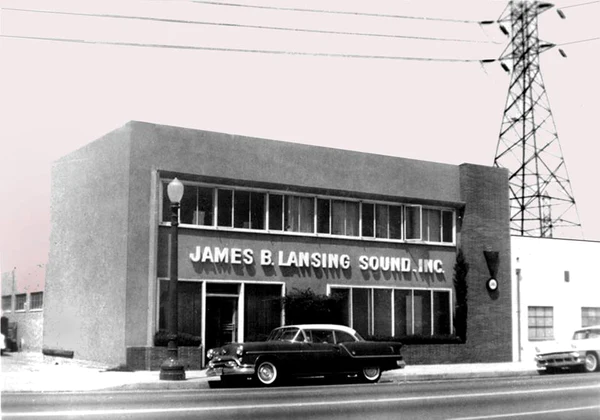
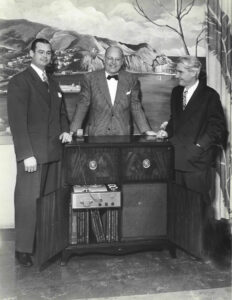
D-130 Loudspeaker
JBL’s first original product was the D130, a powerful 15-inch driver. It was introduced in 1947 and remained in production for the next 55 years: a remarkable run for any product. The D130 featured a four inch flat ribbon wire voice coil and Alnico V magnet.
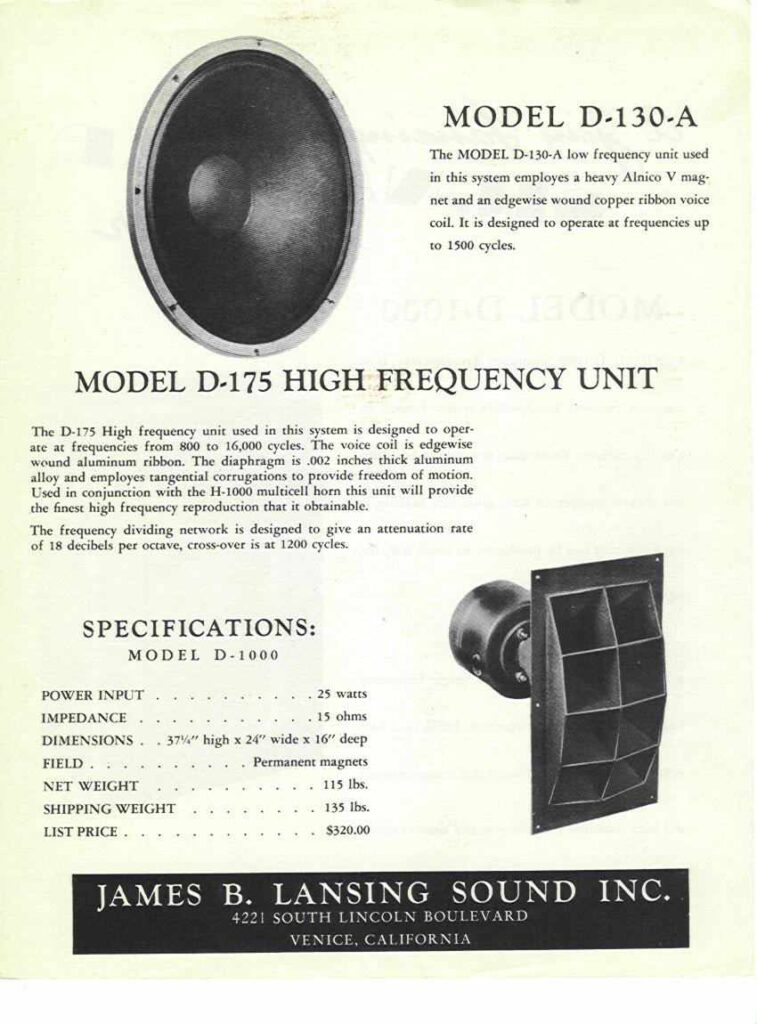
James B. Lansing’s Legacy
James B. Lansing, despite his tragically shortened life, left the Hi-Fi community with a tremendous legacy. His technical innovations alone were remarkable, developing such iconic speakers as the Shearer-MGM, Iconic, Duplex, and the Voice of the Theatre. All of these speaker designs really advanced the state of the art for high power loudspeaker systems. You can see those basic designs are still in use today in home hi-fi, studio, and movie theatre systems. Then there are the two companies that he founded: Altec Lansing and JBL. Both of these companies produced some great speakers over the years, and both are still in business today. Let’s take a look at Altec Lansing and JBL.
Altec Lansing
Altec Lansing has been in the speaker business since 1927 and has produced many iconic Hi-Fi speakers, generally in studio/professional and home versions. The Voice of the Theatre, Valencia, Laguna, and Model 14 speakers are some of their most iconic speakers.
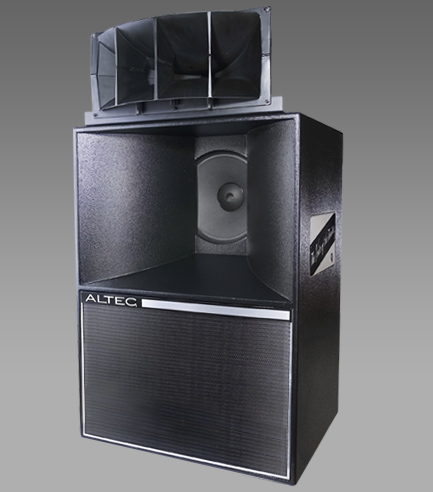
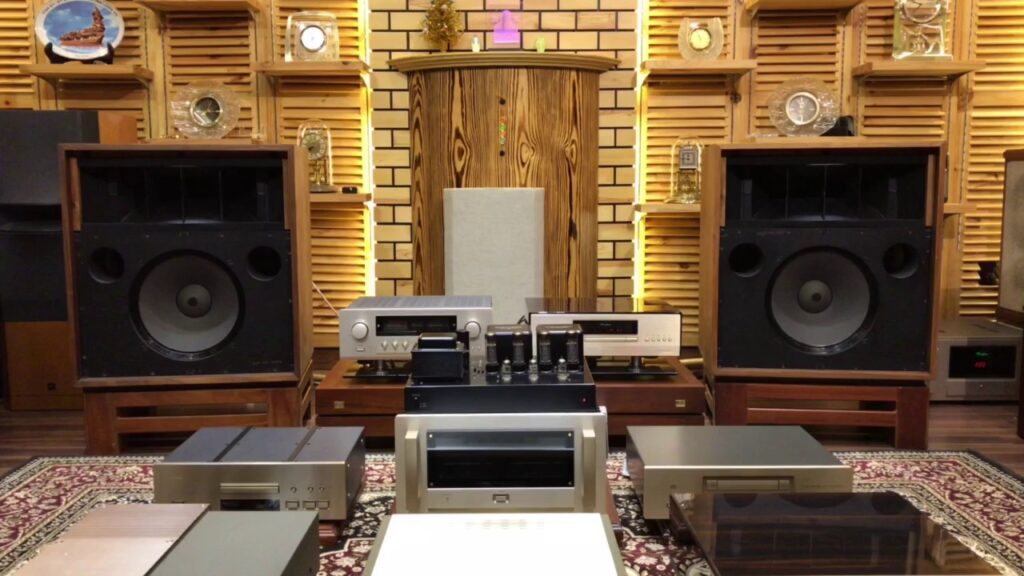
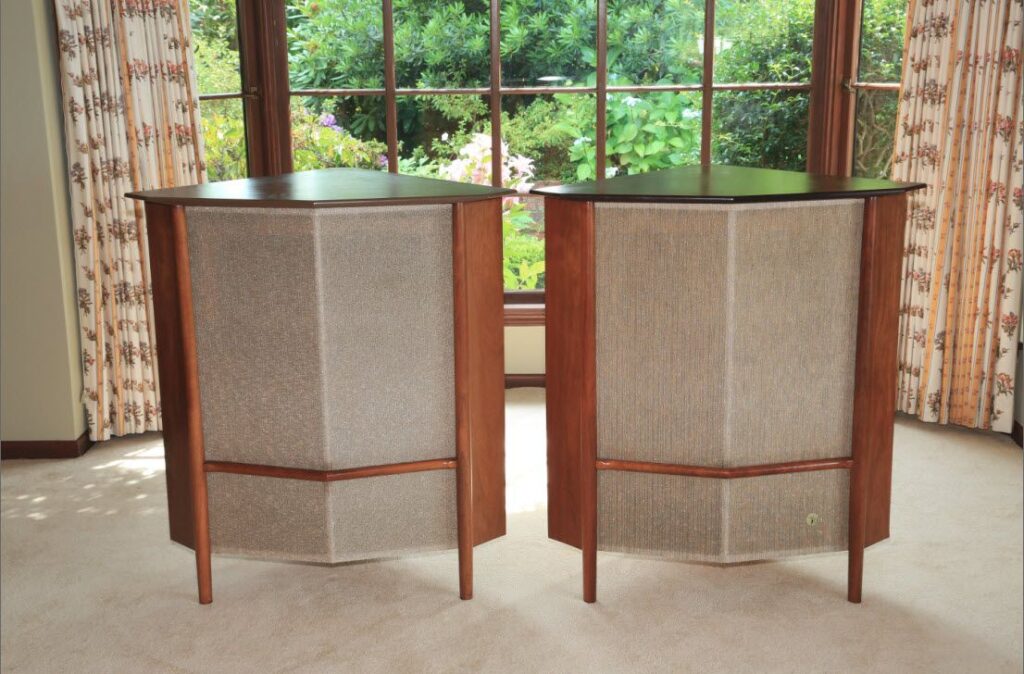
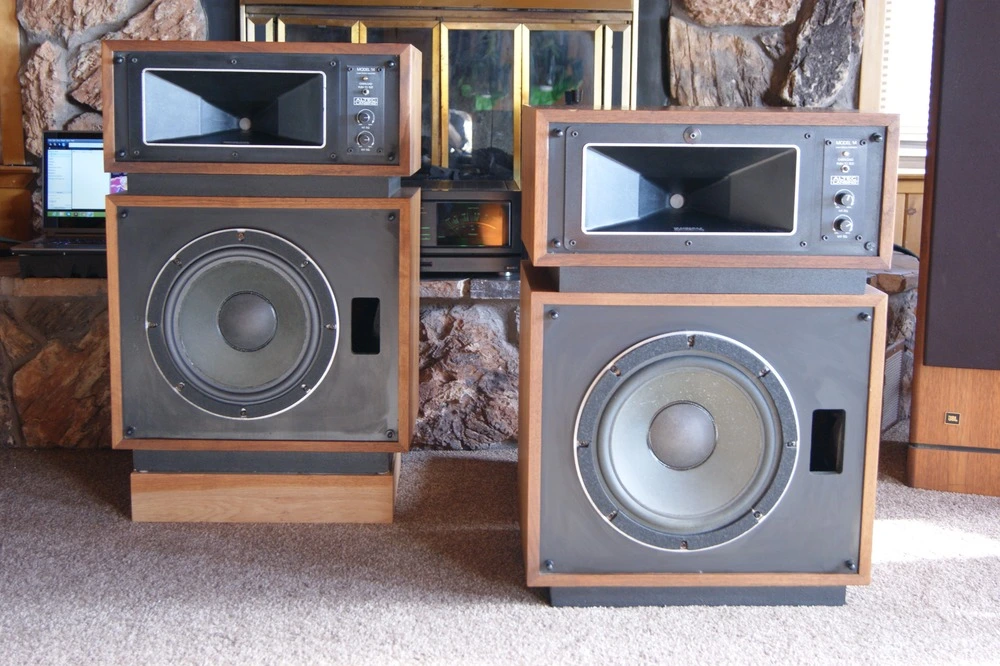
If you would like to see Altec Lansing’s current product line, please click on the link below. There is an “Our Heritage” page which describes the company’s history since 1927.
JBL
JBL was also a prolific manufacturer of Hi-Fi speakers, producing superb designs for both professional and home settings. Their most iconic home speakers were the Hartsfield, Paragon, and L-100 Century.
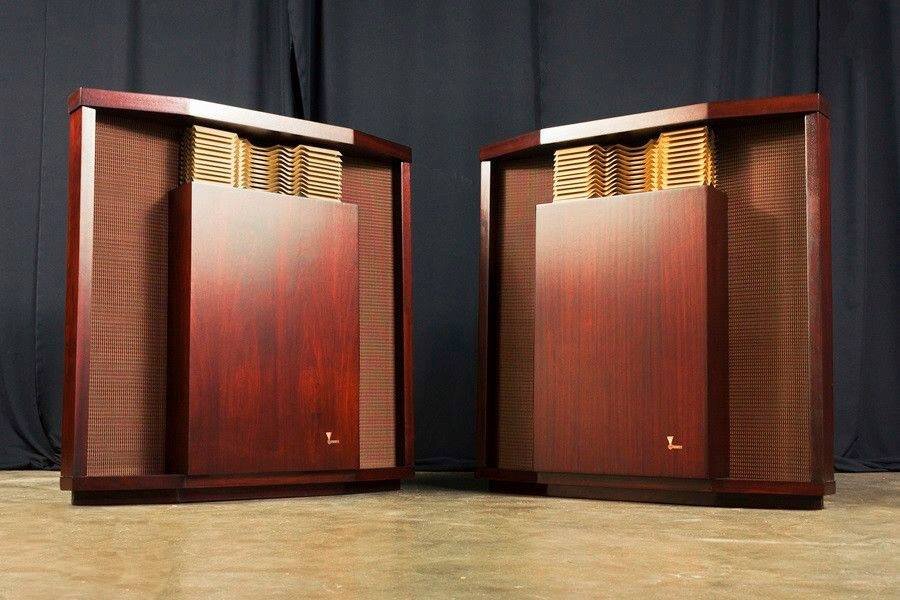
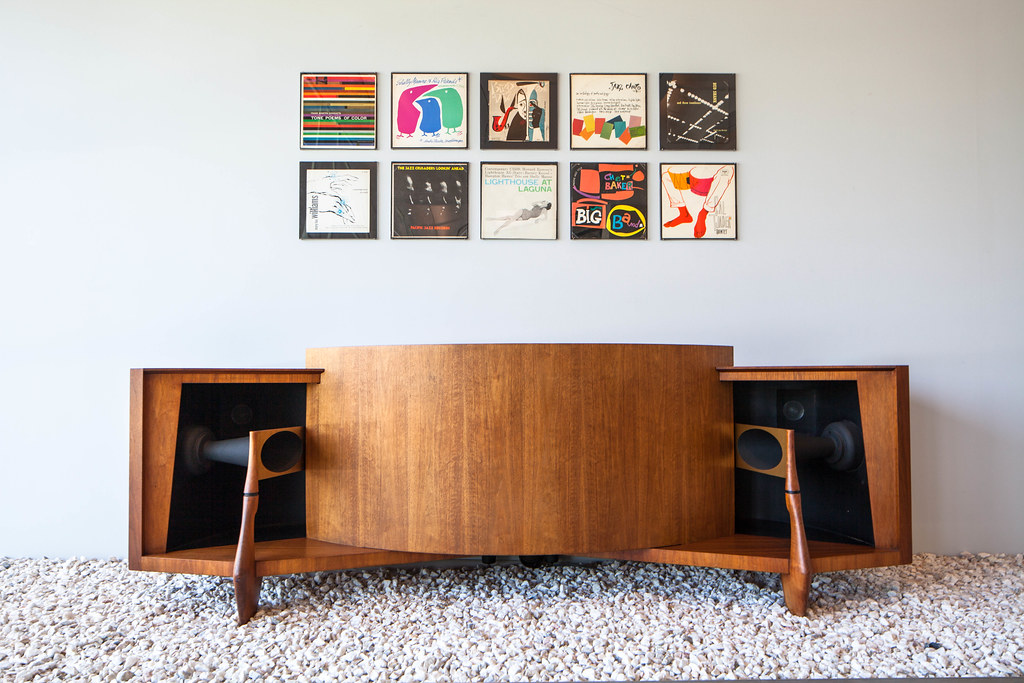
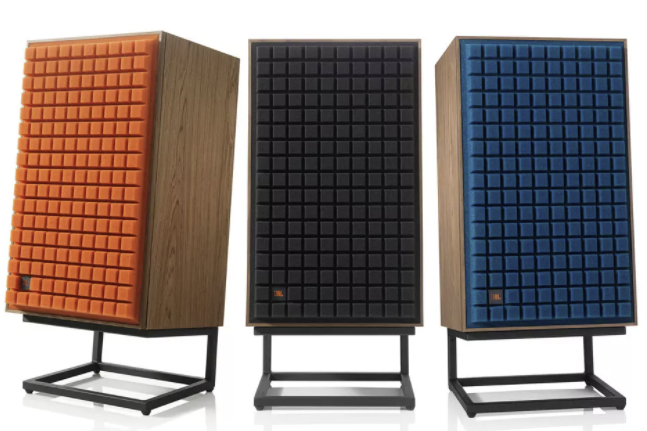
If you would like to see the current line-up of JBL loudspeakers, please click on this link to visit their website.
James Lansing was honored by the Audio Engineering Society in 1958, when they awarded a rare posthumous citation to Lansing “for contributions to loudspeaker design.” If you would like to learn more about James B. Lansing, there is a “Lansing Heritage” website dedicated to his legacy. Just click on the link below.
Induction to the Hi-Fi Hall of Fame
James B. Lansing was truly a pioneer in the Hi-Fi industry. His innovations and the businesses that he founded were essential to the development of Hi-Fi as we know it today. For his many contributions, James B. Lansing is inducted into the Hi-Fi Hall of Fame.
